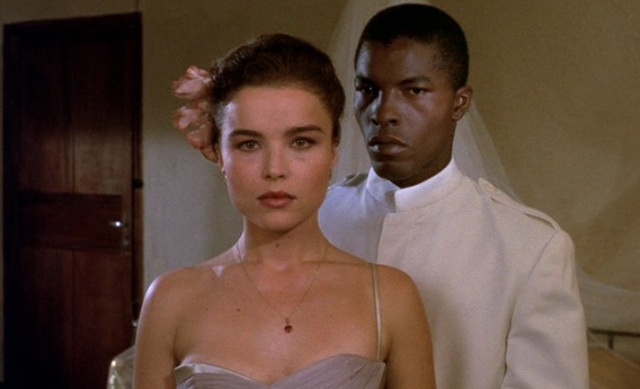Henry James’s suggestiveness and super-subtlety get fairly short shrift in Lindsay Posner’s rather laborious new production of The Turn of the Screw at the Almeida. Inspired originally by an Archbishop’s anecdote, and inspiration, in turn, for Susan Hill’s The Woman in Black and Alejandro Amenábar's The Others, James’s devious 1898 novella - about a Governess’s conviction that her two young charges, Flora and Miles, are possessed by the spirits of depraved dead servants - has been the subject of about as many adaptations as critical interpretations over the years. And its central ambiguity - are the ghosts “real” or hallucinated by the imagination-prone (and love-struck) Governess? – is still capable of provoking a very heated class discussion or two even today, I can attest. Alas, despite some scattered flashes of interest and a few chills, Posner’s ploddy production doesn’t contribute a great deal that’s new to this oft-adapted, much-debated enigma.
Overseen by Hammer – the rebooted studio responsible for James Watkins’s lame film of The Woman in Black and here making a first stage foray – the production attempts to steer a course between psychological study and Gothic spook-fest and thereby retain a certain amount of ambiguity. Posner adds thunder storms and lightning flashes; there are shadows, sudden flares, chalk scraping down a blackboard and all sorts of things going bump in the night. Peter McKintosh’s set revolves to become parlour, bedroom and riverbank and to suggest, as the novella does so brilliantly, the workings of the Governess’s mind: what Edna Kent called “the ebb and flow of troubled thought.” For all these effects, the production lacks atmosphere, though, and there’s a formulaic, workmanlike quality to the scares that means that the proceedings don’t generate enough tension or terror. (Hey, even webcowgirl didn’t scream!) An unnecessary interval doesn’t help, either.
Rebecca Lenkiewicz’s script has its effective and witty touches (“It’s hard to do interesting things and keep your hands clean at the same time,” chirps Flora early on) and nicely brings out the elements of class hostility underpinning the narrative. Yet other notions tend toward the crass and crude (a spot of groping; a masturbation moment for the Governess). The production also cribs rather liberally from earlier adaptations - especially Jack Clayton’s classic 1961 film The Innocents – without coming near to matching the beauty and horror that Clayton’s great images managed to achieve. Throughout, indeed, the material cries out for a more imaginative, theatrical approach than Posner and Lenkiewicz seem able to provide. Watching the production, I began to think more fondly of the 2009 BBC version which, for all its shortcomings, at least attempted to offer a fresh take on the material by vindicating the Governess’s visions and wagging an unfashionably feminist finger at those who’d prefer to view the character as a sexually repressed neurotic.
Here Anna Madeley’s performance certainly gives ample space for such a reading; the actress delivers a solid turn though perhaps not a truly disturbing one. Emilia Jones as Flora (alternating with Isabella Blake Thomas and Lucy Morton) and Laurence Belcher as (a rather too-teenage) Miles both work hard at their demanding roles, and Mrs. Grose’s shift from belief to scepticism is sharply caught by the always-reliable Gemma Jones – once a memorable Fleda Vetch in the BBC’s adaptation of James’s The Spoils of Poynton. (“From Spoilin’ to Screwin’” as a dear James-freak friend of mine wrote me when informed of Ms. Jones's casting.) But the ghosts themselves – Eoin Geoghegan as Quint and Caroline Bartleet as Miss Jessel – are fairly weak presences here, seldom made sufficiently vivid to us to “raise the dear old sacred terror” that their creator desired.
An odd amalgam of the OTT and the undercooked, the production feels inessential, then. Those unfamiliar with James’s tricky tale might glean some enjoyment from this particular turn of the screw. But given the richness and potential of the source material, Posner’s well-intentioned yet ultimately lacklustre take seems a missed opportunity overall.





